Ariosto: Orlando Furioso
Canto XII: The Enchanted Mansion
Translated by A. S. Kline © Copyright 2021, All Rights Reserved.
Illustrations photographed and digitally restored from the Fratelli Treves edition (Milan, 1899) by A. D. Kline.
This work may be freely reproduced, stored and transmitted, electronically or otherwise, for any non-commercial purpose.
Conditions and Exceptions apply.
Contents
- Canto XII: 1-6: Orlando sees a knight carrying off a maid
- Canto XII: 7-12: He pursues them and comes upon a mansion
- Canto XII: 13-16: Orlando is subject to deception
- Canto XII: 17-20: Ruggiero also arrives, in pursuit of the Giant
- Canto XII: 21-22: Atlante had cast a spell on the place
- Canto XII: 23-26: Angelica now arrives in search of a guide
- Canto XII: 27-28: She reveals herself inadvertently to the rivals
- Canto XII: 29-37: But employing the ring escapes their attentions
- Canto XII: 38-47: Ferrau and Orlando quarrel
- Canto XII: 48-51: Angelica alone observes the conflict
- Canto XII: 52-55: She carries off Orlando’s helmet
- Canto XII: 56-62: Ferrau follows Angelica’s trail and finds the helm
- Canto XII: 63-65: Angelica comes upon a wounded youth
- Canto XII: 66-76: Orlando reaches a Paris under siege
- Canto XII: 77-81: Having killed Alzirdo, he routs his company
- Canto XII: 82-85: And then unseats Manilardo
- Canto XII: 86-89: Journeying on he comes to a cave in the hillside
- Canto XII: 90-94: In which he finds a maiden, Isabella
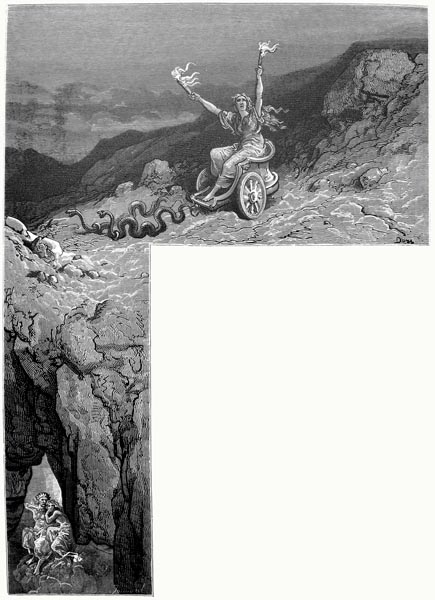
Canto XII: 1-6: Orlando sees a knight carrying off a maid
When Ceres, from her Idaean Mother,
Hastened to return to her lonely vale,
Where fiery Mount Aetna sought to smother
Enceladus who had fought, to no avail,
She failed her fair daughter to discover,
Where she had left her, in the pathless dale,
Rent her hair, scarred her cheeks and breast also,
Then tore up two great pine-trees, in her woe.
She lit them, burning brands, at Vulcan’s fire,
And gave them the power to last forever,
And bearing one in each hand, did aspire
(Her car drawn by two dragons, as ever)
To search the plains, the forest, and higher
Midst the hills, then stretches of fresh water,
Land and sea; and, having searched above,
Plunged to hell, to seek her she did love.
If Orlando, in power as well as will,
Had been the goddess of Eleusis’ peer,
He’d have sought for Angelica o’er hill
And dale, searched fields, plains, forests, water clear,
All earth and air, his purpose to fulfil,
And all the seas, and the infernal mere;
But since he lacked her dragon chariot,
He did the best he could, yet found her not.
Now, having tried all France, he had in view
A search of German lands, then Italy,
And next the two Castiles, the old and new,
And Libya, from Spain, across the sea.
As he was pondering thus, while riding through
A dense wood, a voice he heard, raised in plea.
Onwards he spurred, and saw a steed that strode,
Bearing a knight, ahead, upon the road.
The knight bore in his arms a grieving maid,
Captive o’er his pommel, one filled with woe,
Who struggled fiercely, as she called for aid,
And every semblance of dissent did show,
Seeking help, with every gesture displayed;
And this young maiden seemed, to Orlando,
The very image of his love, I say,
Whom he’d searched all France for, night and day.
Not that I say it was her, but it seemed
To be Angelica whom he loved so,
His goddess, and the one of whom he dreamed,
Whom he now saw commanded by some foe,
And so, he called out, for a foe he deemed
This knight, in a great voice, his ire on show,
Summoning him, with angry threats, in vain,
While granting Brigliadoro full rein.
Canto XII: 7-12: He pursues them and comes upon a mansion
The wretch stayed not, nor granted a reply,
Intent upon his fine and glorious prey,
But straight through the dense woodland he did fly;
The wind blew not more swiftly on its way.
One fled, the other followed, while a sigh
Of sad lament amongst the leaves did stray.
They issued on a spacious meadow; there
A mighty mansion stood, both rich and rare.
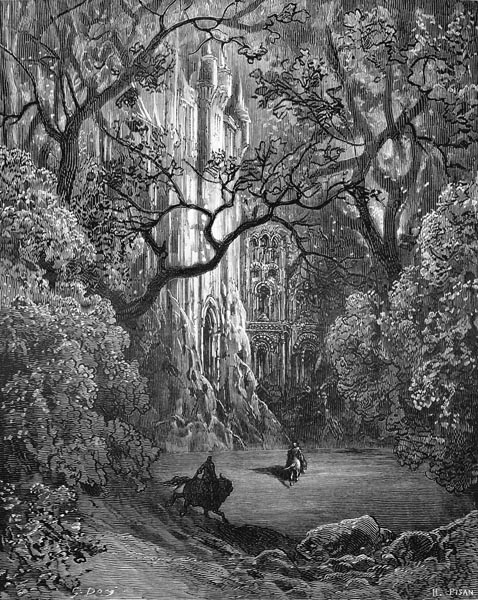
Of various marbles was this mansion wrought
With subtle skill indeed had it been made.
The lady in his arms, the thief now sought
The golden entrance gate that it displayed;
By Brigliadoro he might yet be caught,
Who bore Orlando, proud and unafraid;
And yet, on entering and gazing round,
No sign of knight or maid Orlando found.
The warrior dismounted, then he went
Through the inmost mansion seeking his foe,
Ran here and there, and he was not content
Till he’d searched every chamber, high and low;
For, having looked beneath, his firm intent
Was to check the upper stories, and so
He climbed the stairs, and spent as much labour
On the higher floors as on the lower.
Beds he viewed, adorned with silk and gold,
With never a partition or a wall,
For twas hung with tapestries, as of old,
And rich carpets on the floor covered all.
Orlando searched yet found the trail ran cold,
No glad sight met his eyes in room or hall,
Not one trace of Angelica the fair,
Nor of the vile thief who had borne her there.
Yet as he searched there, and went to and fro,
Full of puzzlement, in vain, there he met,
Ferrau, Brandimarte and Gradasso,
And King Sacripante, and others yet;
And they too were seeking, high and low,
For on that same vain task they all were set;
Cursing, as the chambers they explored,
The malice of that castle’s unseen lord.
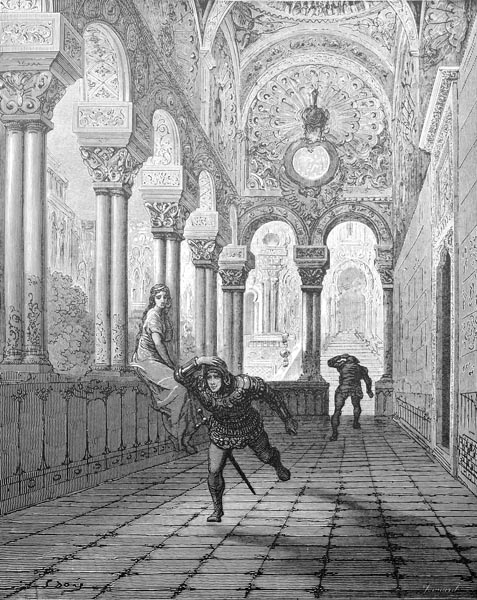
For all now sought the very same offender,
Accusing him of some vile theft he’d wrought,
One that his mount he’d stolen, another
That his beloved lady here he’d brought,
Others of other thefts; and they, together,
In that enchanted mansion thus were caught.
And all, through mere deception, had remained,
Through many a week and month, so detained.
Canto XII: 13-16: Orlando is subject to deception
When Orlando had paced five times or more
Round that strange mansion, to himself, he said:
‘I could waste time and trouble, as before,
Searching this place, in vain, while he, instead,
Has vanished through some other secret door,
And to some far field with the maid has fled.’
And with this thought he took himself outside,
Where a meadow circled all, long and wide.
While he wandered around the wooded hall,
With his gaze still lowered towards the ground,
To see if, to right or left, beside the wall,
Any trace of horse and thief was to be found,
From a window there came a piercing call;
He raised his eyes towards that sudden sound,
Thinking he saw the sweet face, from which he
Was parted, who’d long kept it company.
He thought he saw Angelica, that she,
Called out, in floods of tears:’ Help me, give aid!
To you I commend my virginity,
More than my life and soul. Or, here betrayed,
Must I be raped, must my Orlando see
A robber triumph o’er him?’ cried the maid,
‘Twere better that you slew me, in a breath,
Than leave me to a fate far worse than death.’
These words repeated now, and then again,
Sent Orlando searching through the hall,
Searching, with rising passion, and in pain,
Pain tempered yet with hope. He’d halt withal,
Listen, and hear a voice that he was fain
To think Angelica’s, while her sad call,
(Which came first from one side, then another)
Begged for his help, and yet lacked it ever.
Canto XII: 17-20: Ruggiero also arrives, in pursuit of the Giant
But I must return to Ruggiero,
Whom I’d left in the dense and gloomy wood,
Pursuing the Giant and the lady, though
By now he’d reached the meadow where he stood,
And so attained the place brave Orlando
Had attained before, be it understood.
Through the gate the Giant had swiftly passed,
Ruggiero now followed, closing fast.
And, no sooner had his foot passed the sill,
Than he resumed the chase, searching all
The courts and chambers, yet was cheated still,
For no sign of either found he in that hall;
And, though he’d set to searching with a will,
What he longed for seemed lost beyond recall.
Nor could he see how, in so brief a space,
Giant and lady had vanished in that place.
After four or five times searching every room,
And every hall, and every courtyard there,
He returned to wandering through the gloom
And inspecting the space beneath each stair,
Then thinking them outside, I would assume,
Went forth, but now that voice rose through the air,
Orlando thought he knew, and he no less;
So, he returned within, in deep distress.
The same voice and shape that to Orlando
Seemed those of his adored Angelica,
Seemed Bradamante’s to Ruggiero,
To whom he’d now lost his heart forever.
So equally things seemed to Gradasso,
And Sacripante, and every other:
That the one form and voice, they saw and heard,
Were hers whom they desired most, in a word.
Canto XII: 21-22: Atlante had cast a spell on the place
This was a new and unfamiliar spell
Atlante of Carena had composed,
That Ruggiero in this state should dwell,
And labour so in pain, as if enclosed,
Until the influence, beneath which fell
So many knights by love to death exposed,
Had passed; though his steel tower had proved in vain,
And all Alcina’s art, he schemed again.
And first he had brought there every knight,
From France, that was most renowned in fame,
These Ruggiero would not meet in fight,
Nor risk death now, at the hands of those same.
Beneath his spell, they dwelt, enchanted quite,
And so that none lacked aught who therein came,
He’d stocked the mansion with most pleasant fare
So as to please the knights and ladies there.
Canto XII: 23-26: Angelica now arrives in search of a guide
Next, to Angelica I must return,
(The wondrous ring now in her possession,
That between her lips did concealment earn,
Dormant on her finger twixt each session)
Who’d found, in the cave, that for which all yearn,
Clothes, food, and a horse, in quick succession.
Her design was India to visit,
And, then, her fair realm that lay within it.
Sacripante or Orlando, would she,
(Not caring for one more than the other),
Have gladly wished to have for company,
(Though equally indifferent to either),
But since through many a town and city
She must pass to the East, she had rather
Be escorted, and, as a trusted guide,
Either would pleasant company provide.
One or the other she sought for a while,
Before she stumbled upon either’s trail,
Down the forest roads, for many a mile,
In town and city, and o’er hill and dale.
And yet Fortune led her steed meanwhile
To Orlando’s and Sacripante’s gaol,
Ruggiero’s and Gradasso’s prison too,
Where Atlante’s spell seemed ever new.
She entered, hidden from that mage’s eye,
Concealed by the ring, and inspected all;
Sacripante, and Orlando, found thereby,
Searching for her in vain midst the hall.
And saw her image used to mystify
Their senses; and then on which to call
She considered for a while, in her mind,
And no easy answer to that did she find.
Canto XII: 27-28: She reveals herself inadvertently to the rivals
She knew not which would suit her better,
Count Orlando or Circassia’s king,
Orlando could, possessing greater valour,
Protect her from all risk while journeying,
But, if he played the master, thereafter,
She knew not how to prevent him lording
Himself over her, and command the knight,
Or send him back to France, as of her right;
While Sacripante she could keep in hand,
Though she raised him to the skies above.
She chose him to escort her to her land,
For that sound reason, trusting to his love;
And, thinking him alone, you understand,
The ring now from her lips she did remove,
And showed her face to him, but Orlando
And Ferrau came upon them as she did so.
Canto XII: 29-37: But employing the ring escapes their attentions
Ferrau and Orlando came upon the maid
Because the pair, while searching equally,
To and fro, to that location had strayed,
In quest of their beloved deity.
The ring back on her finger, she’d displayed
Her face, thus both ran towards her swiftly;
For the ring now, perversely, proved her bane,
That which rendered all enchantments vain.
Helmet on head, they were clad in armour,
That pair of warriors I first did name,
For, night and day, they’d worn it, since ever
They’d entered the place; such use, I’d claim,
They were so accustomed to, however,
Twas like a vest to them, and seemed the same.
Ferrau, the third, yet lacked a helm for he
Had none to hand, and refused such, proudly,
Till he should possess the one Orlando
Had taken from King Troiano’s brother,
Almonte; for he indeed had sworn so,
When he sought Argalia’s neath the water;
And though the Count stood near, as you know,
Ferrau could not take it from the other,
For, in that mansion, neither of the pair
Might recognise the other knight, while there.
That mansion, indeed, was so enchanted
That the other’s identity lay hid;
Night and day, nor sword nor shield they wanted,
While dressing in full chain-mail as they did;
Each steed, with its saddle on it planted,
The bridle hanging from it, in a bid
To be more than ready, fed, in a stall,
On straw and barley, near the mansion wall.
Atlante had no power to stop these knights
From mounting in the saddle, now they chose,
To chase after the vision in their sights,
The blonde hair, black eyes, and cheeks like the rose,
Of the one they’d pursued for days and nights,
His enchantments having limits, I suppose.
She was grieved to see them in company,
Though useful if employed successively.
So, once she’d set a decent space between
The mansion and herself, once free of fear
That they were subject to the spell, I mean,
And no sign of the wizard, far and near,
She set the ring to her lips, and was seen,
Swift as a thought doth fly, to disappear,
Vanishing, indeed, before their eyes,
Leaving them stunned, and gazing in surprise.
Now, although it had been her first intent
To take Sacripante, or Orlando,
On her journey as a guide, as they went
To her father Galaphron, who we know
Ruled a distant realm in the Orient,
She disdained to employ them even so,
And unobligated to count or king
Determined to trust solely in the ring.
Spurned, they gazed about the woodland, seeking
With foolish faces, here and there, in vain,
Like a hound upon the trail of something,
Fox or hare, perchance, it has lost again,
While the creature for cover goes fleeing,
To ditch or thicket, or its lair may gain;
While Angelica, observing their plight,
Laughed, unseen, as the three peered left and right.
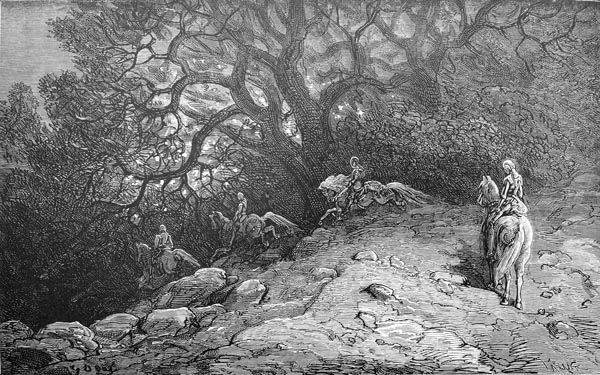
Amidst the woods a single road appeared,
Thus, the trio of warriors concluded,
Twas down that road she must have disappeared.
And, by that means, had their gaze eluded.
Orlando galloped on, whom Ferrau neared,
Then Sacripante, down that secluded
Track, while Angelica reined in her steed,
Then followed them, though at a slower speed.
Canto XII: 38-47: Ferrau and Orlando quarrel
Together then, they came to where the road
Lost itself, suddenly, amidst the trees.
They looked to see if any hoof-prints showed,
Left by a maiden, fleeing like the breeze.
Ferrau, who midst the proudest that e’er rode,
Might have won the prize for pride with ease,
Glared angrily towards the other two,
And shouted to them loudly: ‘Whence, come you?
Turn back, or seek out some other way,
If you look not to meet death, swiftly, here.
Nor in loving, nor in pursuit, I say,
Of my love, need I your company near!’
‘He addresses us,’ Orlando, turned away,
In disgust, to Sacripante, ‘tis clear,
Like the vilest sluts, and the most fearful,
That ever drew the wool from a spindle.’
Then turning to Ferrau again, he said:
‘You brutish sot, if it were not so bare,
Your most ill-chosen words upon your head
Would return, ere you journeyed anywhere.’
Ferrau replied: ‘I care not. Why be led
To care about what causes me no care?
I’ll make good what I said on both of you,
Without a gleaming helm, or more ado.’
‘Ah!’, cried brave Orlando to the king,
‘Lend me your helmet to crown this fellow,
Till I’ve beaten him, and cured his fooling,
For never such a madman did I know.’
‘Who’s then the greater madness in this thing?
The monarch said, ‘If he’s an honest foe,
Lend him your own, I am no less able
To beat a madman, and that’s no fable.’
Said Ferrau: ‘You’re the foolish ones; if I
Chose to wear a helmet, then, already,
Yours were lost in the twinkling of an eye;
Taken, the moment you proved ready.
But know that I have sworn a vow whereby
I wear no helmet, till the day I see,
And win, the helm that’s worn by Orlando,
Charlemagne’s warrior, and treat him so.’
‘So, you think,’ the Count said, smiling coldly,
‘That you, bare-headed, could repeat the deed
Orlando performed in Aspramonte,
On Agolante’s son Almonte? Indeed,
From head to foot you’d shake, best believe me,
If you saw him face to face, for you’d need
Not only to forego the helm but give
Him all your other arms, if you would live.’
The Spaniard replied thus, boastfully:
‘Many and many a time I’ve had him so,
In such straights, I could have easily
Stripped both helm and arms from Orlando,
And if I did not; well, tis full oft that we
Desire a thing we once chose to forgo;
I wished it not, do now, and hope no less
On meeting with him, to find swift success.’
Losing patience now, Orlando cried:
‘Deceitful wretch, tell me in what country
You met me then, for truly you have lied;
Where did you gain so great a victory?
I am that knight; your boast is here denied;
No doubt you thought me far off; we shall see
If you can take the helmet from my head,
Or whether I’ll take all from you instead.
Nor would I seek the smallest advantage,’
He cried, and took the helmet from his brow,
And hung it on a beech tree, in his rage,
Unsheathing Durindana, and yet, now,
Brave Ferrau lost not an ounce of courage,
But drew his sword, a moment did allow,
Then, calmly, her raised his shield on high,
To seek defence of his bare head, thereby.
And then fierce battle the pair commenced,
Their two chargers wheeling round and round,
While where the plate was thinnest, as they fenced,
Steel pierced steel, and where the joints were found.
Nor were there e’er two knights (both were incensed)
As well-matched as that pair, above the ground,
So equal in vigour, and in ardour,
Neither combatant could wound the other.
Canto XII: 48-51: Angelica alone observes the conflict
I presume you’ve understood already,
That Ferrau by a charm was protected,
Except at that point where in the belly
A vestige remained of what connected
The mother to the child, internally;
And so, till he was by death selected
He chose to hide the vulnerable part,
Neath several layers of the armourer’s art.
Equally protected was Orlando,
Everywhere but in a single place,
For he could be wounded, you should know,
Beneath one foot, and thus he used to face
His enemies sheathed skilfully below;
The rest of him a tough hide did encase,
Diamond hard; thus, to battle both men went
Armoured less for defence than ornament.
The fight twixt the pair was hard and bitter,
Raising fear, dreadful for the eye to see;
Since Ferrau, with every blow, struck harder,
And none was less than full, assuredly,
While Orlando sought to split and shatter
Chain-mail and plate, and did so readily.
Angelica remained invisible,
And she alone now watched the spectacle,
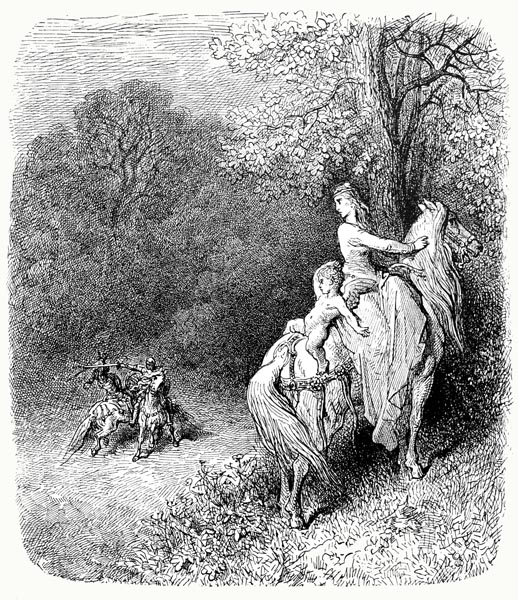
For the King of Circassia, meanwhile,
Sacripante, who thought Angelica
Not far in front, perchance less than a mile,
Believing the fight might last forever,
Spurred his charger on its way, in good style,
Hoping that he might thus come upon her;
So, the only witness, once he was gone,
Was this fair daughter of King Galaphron.
Canto XII: 52-55: She carries off Orlando’s helmet
After she had stood a while observing
The dire and dreadful conflict underway,
And found them both equally deserving
Of victory, though in danger every way,
Her desire for novelty, e’er unswerving,
She thought to carry off the helm, in play,
To see what they would do on noticing
The theft, though she knew twas not for keeping.
She intended to return it to Orlando,
But first would toy a little with the knight,
Thus, she took the helm, and hid it also,
And stood a moment gazing at the fight;
Then, upon her way, silently, did go,
And soon, in all respects, was out of sight,
Ere either knight had realised it was gone,
So fierce the task they were engaged upon.
But Ferrau noticed it had disappeared,
And so disengaged from the encounter.
‘What fools we are, tis as we might have feared,
That knight that was with us proved a traitor!
What good if either had to victory steered,
If we possess the helm, our prize, no longer?’
Orlando glanced upwards at the tree
Where it had hung, and bristled angrily.
With Ferrau, he was in accord; twas clear
That the knight who’d accompanied them before
Had stolen it, and was no longer here,
So, he leapt on Brigliadoro once more.
On seeing him about to disappear,
Ferrau pursued, over the forest floor.
Both soon came to fresh prints upon the ground;
The tracks of knight, and maiden too, they’d found.
Canto XII: 56-62: Ferrau follows Angelica’s trail and finds the helm
Towards a vale on the left, rode the Count,
On the path taken by Sacripante;
Ferrau chose the route, closer to the mount,
Down which Angelica had sped, swiftly,
Meanwhile Angelica had reached a fount,
A pleasant site, welcoming her sweetly,
For travellers it drew to its cool shade,
Nor without drinking might they quit the glade.
She halted there beside the clear water,
Believing none would disturb her there.
And then would not the wondrous ring hide her,
That, she might linger, free of every care?
She hung the helm on a branch, above her,
And to the tree’s trunk she tied her mare,
So, the creature could graze upon the grass,
And there among the greenest herbs might pass.
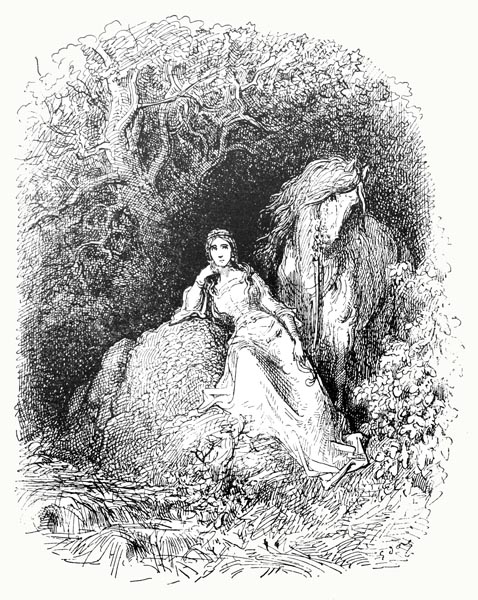
But the bold Ferrau to the fount now came,
Having followed hard on her trail, once more,
And no sooner did the maiden spy that same
Than she vanished on the mare, as before.
She somehow dropped the helm, nor could reclaim
The thing; it rolled across the forest floor;
While Ferrau, once he had the maid in sight,
Sprang towards the fleeting vision with delight.
She vanished, as I’ve said, before his eyes,
As fantasies in dreams do, when we wake,
While he sought for her everywhere, his prize,
Yet he found not a sign midst bush or brake.
Invoking Mahound, Termagant likewise,
As many a curse, and prayer, he did make,
Ferrau returned to seek the woodland fount,
And came upon the helm of our brave Count.
The helm was recognisable; around
Its rim were letters, written clearly there,
Proclaiming, as about the helm they wound,
How Orlando won it, from whom, and where.
Ferrau set on his brow the helm he’d found,
Who, in spite of his grief, could not forbear;
His grief, at losing her, now fled from sight,
Like to some passing phantom in the night.
Once he had set the helmet on his head,
All that he needed, to be quite content,
Was to find Angelica, who, instead,
Much like a flash of lightning came and went.
He searched the woods, amidst which he now sped,
Yet seemed forever balked of his intent,
And finding ne’er a trace, his passion spurned,
To Paris, and the Spanish camp, returned,
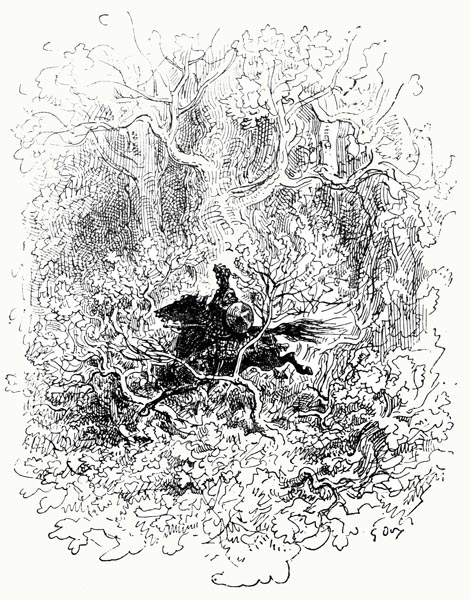
Tempering the pain yet burning in his breast,
At failing to achieve his fond desire,
With the coolness of the helm, now at rest
Upon his brow and not Orlando’s, entire,
As he had sworn. Meanwhile the Count once blessed
With news of that ill deed, sought him, with ire,
Until the day he took it from his head,
Where, between two bridges, he laid him dead.
Canto XII: 63-65: Angelica comes upon a wounded youth
Angelica, unseen and quite alone,
Went on her way, but with a troubled brow,
Bemoaning the helm, all too swiftly flown,
Now lying by the fount, or neath the bough.
‘Wishing to do what I should not, I own
Twas stolen from the Count, which I avow
Was a fine reward for all I owed the knight,
Who though obliged to him, am yet in flight!
With only good intentions (as God knows)
Hoping some fair effect might be achieved,
I took the helm, thinking the path I chose
Might bring about a truce, as I believed,
Not that the Spaniard should upon it close,
And gain through me what he has thus retrieved.’
Onwards she rode, the while lamenting so,
At having snatched the thing from Orlando.
Angry at herself, filled with discontent
She took a seeming path towards the east,
Sometimes concealed, and sometimes evident
(If that proved opportune) to man or beast.
Through many a field, and meadow, she went,
And came where two companions, deceased,
Lay in a wood and, twixt the pair, a youth,
With a blood-stained breast, half-dead in truth.
Canto XII: 66-76: Orlando reaches a Paris under siege
Yet no more, for now, of Angelica,
Many a venture I must first narrate;
Nor of bold Ferrau shall I speak further,
As yet, nor on King Sacripante wait.
Orlando wishes that my verse should linger
Not upon them, but rather should relate
His labours, and the troubles he sustained
Pursuing his quest, yet with little gained.
At the very first town to which he came,
He donned a new helmet, concerned to go,
Now well-concealed, behind that very same,
Unconcerned about its strength; twas for show,
Since his life was so charmed (or such the claim)
It mattered not if it were strong or no.
Thus, hidden by his helm, he could maintain
His search by day or night, in sun or rain.
It was the hour when Phoebus leads his team,
With dew-wet hides, from out the ocean deep,
Aurora spreading o’er the sky her gleam
Of red and gold that summons us from sleep,
As the stars cease their dance, and we our dream,
Departing, veiled, their hidden watch to keep,
When, passing close to Paris, Orlando
All the virtues of his great worth did show.
He encountered two squadrons: Manilardo,
His was the first, a white-haired Saracen,
King of Noritia, once fierce, also,
But fitter now to counsel than lead men;
The second flew the banner of Alzirdo,
Tremisena’s monarch, called, now and then,
Amidst the Africans, the perfect knight,
By those who knew him, and had seen him fight.
With the rest of the Saracen army,
They had wintered in camp, some far afield,
Some, as these two squadrons, near the city,
In villages and hamlets, unconcealed,
For King Agramante, who had many
A day sought to make its high walls yield,
Had now laid siege to Paris, in this guise,
Lacking the means to gain it otherwise.
An infinite host had the king on hand,
For, in addition to his own vast army,
And that of Spain, also a mighty band,
Led by Marsilius, there were many
Frenchmen in his pay, you understand;
From Paris to the Rhône, or Gascony,
All were subject to Agramante’s power,
Except for the odd fortress keep, or tower.
Now the quivering streams commenced to flow,
And free their warming waves of winter’s ice,
While the heat persuaded fresh grass to grow,
And new leaves from the bark did thus entice,
The king gathered all that his flag did follow,
And shared his luck (some for a goodly price),
Mustering his armed forces from their lairs,
To grant a better shape to his affairs.
And so it was that Noritia’s king
And Tremisenas’ monarch gathered there,
In ample time for that grand reckoning,
In which each squadron, good or bad, would share.
Thus, Orlando chanced, in his journeying,
As I have said, to meet the royal pair,
Our brave knight, as was his wont, seeking her
On whose account he was Love’s prisoner.
Alzirdo saw Orlando approaching,
One unequalled on this earth for valour,
So glorious, and so proud in seeming,
Mars might have been thought inferior,
And was astounded both by his coming,
And by his fierce glance, each angry feature,
Esteeming him a knight of great prowess,
While far too ready those skills to assess.
For Alzirdo was young and arrogant,
Known for his strength of heart, and his right arm.
He urged his steed forward, in an instant,
Yet should have held his place, free there from harm.
Orlando, being in his element,
Soon pierced that heart, nor felt the least alarm.
The monarch’s steed now fled the field in fear,
Lacking a rider, who his course might steer.
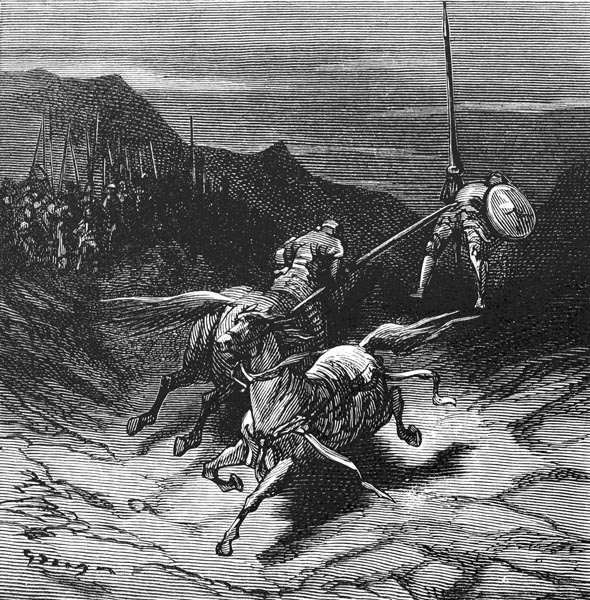
Arose a sudden and horrendous cry,
And filled all the air with mournful sound,
As his companions saw him fall, and die,
The blood from out his breast shed all around.
In a moment, at the Count, men did fly,
En masse, with lance and sword, to surround
Our knight, gleaming arrows speeding, swiftly,
Towards that finest flower of chivalry.
Canto XII: 77-81: Having killed Alzirdo, he routs his company
With a sound like that of the bristling boar
That charges from the woodland or the hill,
If a wolf or bear treads the forest floor
Or descends from the mountain for its kill,
And takes some squealing runt, as oft before,
That grunts and moans a while, then lies still,
So, each of these attacking foes cried out:
‘At him!’, in one fierce and furious shout.
Many a sword and arrow, many a spear,
Struck his breastplate and pierced his shield,
While at his back a mace attacked his rear;
Yet, to such vile opponents, he’d not yield,
As at his sides, and in front, they drew near,
He who feared not such as these in the field,
Nor counted them more than the wolf the flock
When there, amidst the fold, it runs amok.
In his right hand his naked sword he held,
That had brought death to many a Saracen,
And he who’d count the slaughtered in that meld
He would have found his task as hard again.
The road ran red with blood from those he’d felled,
Scarce was there space to hold so many men;
For neither shield nor helm e’er defended
Where Durindana’s fatal blade descended,
Nor did their cotton robes, nor turbans, wound
In a thousand folds about their heads, deny
His sword, but shoulders, arms, heads, bound, unbound,
To join their sad cries, through the air did fly.
And cruel Death now roamed about, and found
His home in many a glazed and horrid eye:
‘Durindana in Orlando’s hand doth shine,’
He cried, ‘tis worth a hundred scythes in mine!’
One fierce blow scarce waited on another.
Soon the whole host of foemen was in flight.
And while before they’d sought to smother,
By their number, this solitary knight,
None now stopped e’en to defend a brother,
For each sought but to hasten from the fight;
Here one on foot, there another, mounted,
Careless of their road, they fled, uncounted.
Canto XII: 82-85: And then unseats Manilardo
Valour bore a mirror, near Orlando,
A glass that revealed the coward’s tremor;
None dared looked therein, but Manilardo,
Whose aged blood was chilled, not his ardour;
He thought to die was better than to show
A shameful fear, flee, and find dishonour;
I speak of Noritia’s king, whose stout lance
He couched, to meet the paladin of France.
And broke it on the edge of his strong shield,
While Orlando withstood the blow unmoved,
And answered him by striking, as he wheeled
At the king’s armour, yet in error proved
Since fortune helped the king, although he reeled
At the stroke, for the bright sword blade moved
And turned, in descent, in Orlando’s hand;
Yet was such as the king could not withstand.
From the saddle he fell, stunned, to the ground,
Nor did Orlando turn to view his fall,
But cut and slashed, cleft and slew those around,
While seeming close upon the heels of all,
As a merlin will stoop, with ne’er a sound,
On a flight of starlings, ere its recall.
Likewise, of the squadron he had shattered,
Some flew, some fell, and the others scattered.
Nor did he cease to wield his blood-stained sword
Till not a living soul still kept the field.
He was doubtful, then, which road might afford
Best passage; would right or left now yield
A furtherance of his quest? Naught reassured,
Though to the land about him he appealed.
He sought Angelica where she might be,
Fearing to take some road quite contrary.
Canto XII: 86-89: Journeying on he comes to a cave in the hillside
Through the fields and through the woods he went,
(Often enquiring for the maid, he sought);
Beside himself, and filled with discontent,
Our knight strayed from the beaten path, in short,
And came at eve to a mount where a vent
Showed a distant flame that within did sport;
So, swiftly, he approached that stony lair,
In case Angelica was lodging there.
For as beneath low-hanging juniper,
Or in the stubble of an open field
The fearful hare is sought by the hunter,
Lest in some deep furrow she’s concealed,
Or down an untrodden track doth wander,
Where brambles or a thicket might yet yield
A sighting, so Orlando, where hope led,
E’er searching for his lady, onward sped.
Towards that ray of light, he rode in haste,
And came to where it shone within the wood,
Out of an opening, in the rocky waste,
That showed a spacious cave within; there stood
Before it a high wall of brushwood placed,
To form a barrier, and so make good
Its inhabitants’ defence, a thorny charm
To keep them safe from outrage, and from harm.
It was hidden from the eye through the day,
But the bright flame revealed the place at night;
He though he knew what purpose it might play,
Yet to be certain wished to see outright,
What lay within, and once he’d led away
Brigliadoro, and tethered him, our knight,
Slid, silently, past the sharp branches there,
Without a word of greeting, but great care.
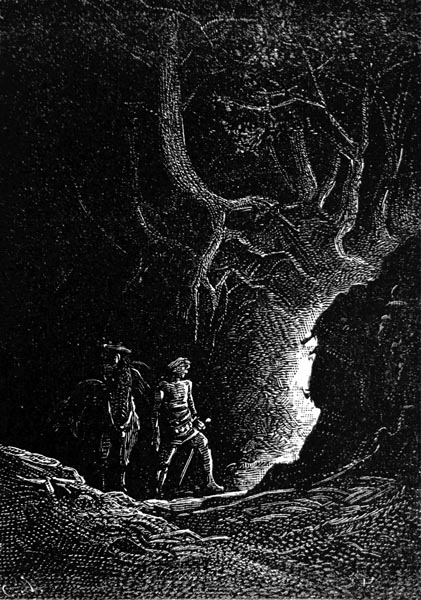
Canto XII: 90-94: In which he finds a maiden, Isabella
A flight of steps descended to this tomb,
Though one where living people were interred;
Carved from out the rock the vaulted room
A certain airy spaciousness conferred,
And then, natural light dispelled the gloom;
Though little from the entrance was transferred,
A window of a kind showed somewhat bright,
Created by a fissure on the right.
Amidst the cave, beside a fire’s glow,
Sat a girl, possessed of a pleasant face,
She seemed but fifteen years of age or so,
As far as he could see, in that dark place;
And beautiful enough, thought Orlando,
To make a paradise, one filled with grace,
Of that harsh and stony cavern, although
Her tearful eyes declared her heart’s deep woe.
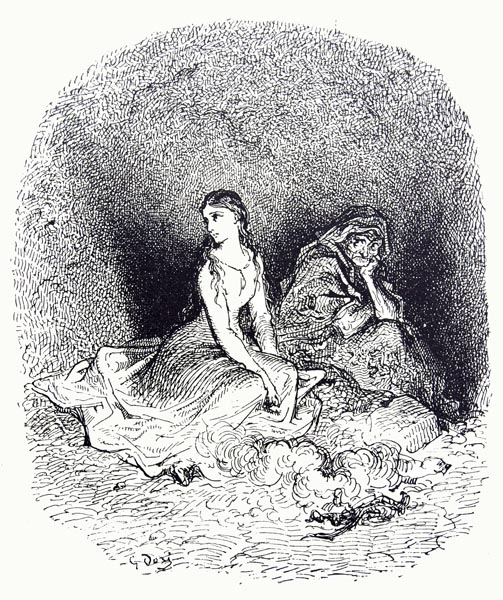
And old woman sat with her, and the two
Quarrelled gently in the feminine manner,
But the moment the Count came into view
Silence fell, not a word more did they utter.
Orlando greeted them as one should do,
With the courtesy due to women, ever,
Then rising, instantly, from their seat,
Benignly, both the warrior did greet.
True, each gaze apprehension did betray,
On seeing him appear so suddenly,
As he descended, from the light of day,
Fully-armed, for fierce he seemed to be.
Yet Orlando asked, in a modest way,
Who was he, so lacking in courtesy,
So unjust, as to bury in that place,
Such a noble, and kind, and loving face.
The virgin maid then, haltingly, replied,
Her soft speech interrupted by sweet sighs,
Twixt bright pearl and coral there, scarce denied,
While, midst the rose and lily, from her eyes
Tears flowed, that often twixt her lips did glide,
For her sorrow moistened them likewise.
Yet, to the next, for the rest, please attend,
For it’s time to draw this canto to an end.
The End of Canto XII of ‘Orlando Furioso’